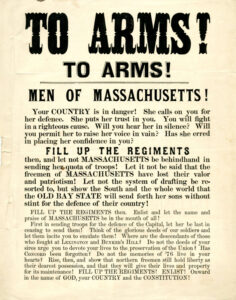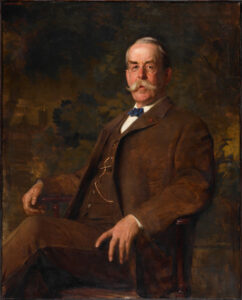True Tales: To Arms! To Arms!
By George T. ComeauThe Bowditch family was one of New England’s most upstanding families. Most notably the American mathematician Nathaniel Bowditch was perhaps the most illustrious of the line. Born in Salem in 1773, he is often credited as the founder of modern maritime navigation. His book The New American Practical Navigator, first published in 1802, is still carried on board every commissioned U.S. Naval vessel to this day.
Nathaniel’s great-grandson, Charles Pickering Bowditch, was born in Boston in 1842. Much of Charles’s youth was spent in Ponkapoag. The family summered here from the 1840s through much of the mid 19th century. The son of Jonathan and Lucy Orne Nichols, young Charles most certainly explored the Blue Hill range and the rural country life of Canton. His mother was the granddaughter of Col. Thomas Pickering, who had served as an aide to General George Washington during the Revolutionary War. Great things were destined for young Mr. Bowditch. A memoir notes that aside from the greatness of his connection to the Bowditch line, “All the other strains which mingled in his veins were of the best that New England offers, vigorous and able people of high integrity, great public spirit and distinct purpose in life, good citizens in every sense of the word.”
Life in Canton was bucolic for a wealthy boy. Growing up near the shores of Ponkapoag Pond, his childhood memories were of “pleasant surroundings and the atmosphere of a cultivated home.” Bowditch was educated at home by a private tutor with keen oversight under the eyes of his mother. In the summer of 1859 Bowditch entered Harvard and was a distinguished student. After a hazing incident that involved eight classmates, Bowditch was suspended for taking part in an affair that questioned the faculty response. Bowditch returned to Harvard in May 1861 and graduated soon thereafter.
During the months that Bowditch was suspended, he spent time in Washington, D.C. Just weeks before resuming studies at Harvard, Bowditch stood within 10 feet of President Lincoln at the inaugural speech of our 16th president. Bowditch wrote, “I shall always regret that I was unable to detect under his rough exterior some of the wonderful qualities which were in him.” A biographer wrote that it was a “wonderful opportunity, and very likely contributed more to Bowditch’s development than a month or more at Harvard would have done.”
Later that same year, in July, the defeat of the Union at the First Battle of Bull Run roused Bowditch to ask his father if he could join a regiment. A series of letters between the father and son yielded a consistent “no” from the father. Bowditch wrote, “The country must be aroused to the sense of its dangers. The regiments are not filling up fast and if this goes on the barbarous system of drafting must be resorted to. The country wants soldiers and I think that every gentleman and gentleman’s son ought to go into the field. Such a proceeding would exercise a good influence on everybody. Nobody here seems to be awake.”
He then printed and distributed a broadside to encourage enlistment and appeal to the reader’s sense of patriotism and history. In bold letters it exclaimed, “To Arms! To Arms!” Bowditch’s parents were unmoved. Bereft with anger, Bowditch wrote to his parents and closed with, “I think you both show a lack of patriotism.” In May 1863 Bowditch was commissioned as a second lieutenant in the 55th Mass. Volunteer Infantry. The soldiers comprising the 55th were recruited by white and black abolitionists such as William Lloyd Garrison and Frederick Douglass from across the North. Bowditch distinguished himself by rising to the rank of captain, and then served as a captain in the 5th Massachusetts Volunteer Cavalry, also a colored regiment. Bowditch was discharged due to chronic illness in August 1864.
The experience in the Civil War opened the mind and spirit of this young man. A biographer wrote, “His experience with the negro troops under his command gave him a great respect for them, and a deep interest in the fortunes of the race. He recognized the nation’s debt to the negro, his gifts to the colored schools were constant and he was always glad to meet their teachers. His friendship for the colored race showed itself in help of many kinds while he lived.”
Bowditch went on to marry the daughter of a congressman who also served as a senator from Massachusetts. Landing a job as an estate manager in upstate New York, Bowditch managed 14,000 acres of land and engineered the drainage of 9,000 acres of marshland, which greatly profited the estate. In time he became a director of the Massachusetts Cotton Mills in Lowell and Georgia. He also took on managing the Pepperell Manufacturing Company and became instrumental in the many factories that were producing cotton. His business acumen led him to the highest levels of the boardroom and he followed his father and grandfather as the president of the very conservative Massachusetts Hospital Life Insurance Company. Bowditch also was a director of the Boston & Providence Railroad, which ran through his hometown of Canton.

A broadside printed and distributed by Charles Pickering Bowditch in 1862 to encourage enlistment (OnView: Digital Collections & Exhibits, Harvard Center for the History of Medicine)
There was another side of Bowditch that is even more notable. In addition to his business interests, he had a deep interest in archeology. As a founder of the American Anthropological Association, he supported archeologists in funding and connections. It was a pleasure trip to the Yucatan in 1888 that was the watershed moment in his life. In his day, he was the greatest benefactor to the Peabody Museum at Harvard University. In 1891, Bowditch planned and financed the first expedition to Central America. The discoveries that are credited with Bowditch’s work are phenomenal.
Of course, deep in Bowditch’s lineage was that of his great-grandfather, the mathematician. Bowditch was a pioneer in hieroglyphic inscriptions of the Maya. A seminal book authored by Bowditch, The Numeration, Calendar Systems, and Astronomical Knowledge of the Mayas, was deemed a “landmark study of Central American writing.” Bowditch wrote and researched extensively and also had several critical manuscripts and codices published for American scholars. Included in these publications was the printing of the Nuttall Codex, the Laud Codex, and the Florentine Codex in Florence, Italy, to be made available for study and scholarship. It has been said that “there is perhaps no other instance in American anthropology where an effort in one field of interest was so long sustained, so intense, and so productive of results.”
Our boy from Ponkapoag found a life and world of curiosity. Trips to Mexico, Yucatan, West Indies, Honduras, Sicily, the Philippines, Java and Japan — all against the backdrop of the conventional trips to Europe — filled an active mind and vital life. A memoir of Bowditch’s life summed it up perfectly: “He lived a happy, a full and a very useful life. He made friends always, and though his vigorous speech sometimes gave momentary offense, it left no feeling of resentment, and he had no enemies. Whatever his hand found to do he did it with his might, and his place is among those high-minded, warm-hearted, able and public-spirited citizens to whom Massachusetts owes her standing in the country in the world.”
Short URL: https://www.thecantoncitizen.com/?p=78205











